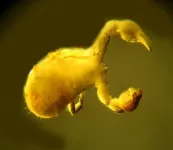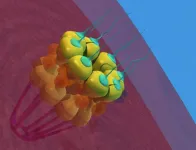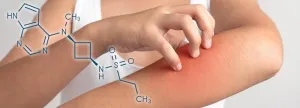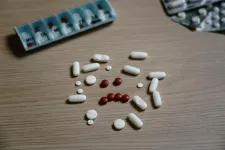(Press-News.org) Philadelphia, June 6, 2024 – A new study in Heart Rhythm, the official journal of the Heart Rhythm Society, the Cardiac Electrophysiology Society, and the Pediatric & Congenital Electrophysiology Society, published by Elsevier, examined the potential dangers of consuming energy drinks for patients with genetic heart diseases. A cohort of 144 sudden cardiac arrest survivors was examined at Mayo Clinic, of which seven patients (5%) had consumed one or more energy drinks in close proximity to their cardiac event. While the study did not prove direct causation, caution is advised, and doctors recommend that patients consume energy drinks in moderation.
Lead investigator of the study Michael J. Ackerman, MD, PhD, Genetic Cardiologist at Mayo Clinic and Director of the Mayo Clinic Windland Smith Rice Sudden Death Genomics Laboratory in Rochester, MN, says, "The energy drink market in the United States has been growing consistently over the past few years, raising concerns about the potential combined effects of caffeine consumption and additional unregulated ingredients in these beverages. Energy drinks are not regulated by the US Food and Drug Administration (FDA), so researching the effects that these drinks have on our patients is of utmost importance."
Energy drinks contain caffeine ranging from 80 mg to 300 mg per serving, compared with 100 mg in an 8-ounce cup of brewed coffee. However, most of these energy drinks contain other stimulating ingredients in addition to caffeine that are unregulated by the FDA, such as taurine and guarana. It has been postulated that the highly stimulating and unregulated ingredients alter heart rate, blood pressure, cardiac contractility, and cardiac repolarization in a potentially pro-arrhythmic manner.
Ehud Chorin, MD, PhD, Tel Aviv Sourasky Medical Center and Sackler School of Medicine, Tel Aviv University, co-author of the accompanying editorial commentary "Arrhythmogenic Foods – An Underestimated Medical Problem?" says, "Establishing a probable cause of an arrhythmia includes inquiring about a potential exposure to toxins or medications. An increasing number of substances in the standard diet are found to have unwanted cardiac effects, prompting the consideration of a novel subcategory in a patient’s clinical history intake: arrhythmogenic foods. Energy drinks fall in this category. The findings reported in this study should be viewed in the context of the large body of evidence suggesting arrhythmogenic effects of certain foods, especially when consumed in large quantities or large concentration by high-risk patients."
In addition to examining the consumption of energy drinks among the cohort of sudden cardiac arrest survivors, the researchers also looked closely at the type of cardiac event as well as the conditions surrounding the event, such as exercise and other stressors known to be associated with genetic heart disease-associated cardiac arrhythmias.
Dr. Ackerman explains, "While there seemed to be a temporal relationship between energy drink consumption and the seven patients' sudden cardiac arrest event, a myriad of potential 'agitators' that could have also contributed to a genetic heart disease-associated arrhythmia occurred, like sleep deprivation, dehydration, dieting or extreme fasting, concomitant use of QT-prolonging drugs, or the postpartum period. As such, unusual consumption of energy drinks most likely combined with other variables to create a 'perfect storm' of risk factors, leading to sudden cardiac arrest in these patients."
Peter J. Schwartz, MD, FHRS, Istituto Auxologico Italiano IRCCS, Center for Cardiac Arrhythmias of Genetic Origin and Laboratory of Cardiovascular Genetics, Milan, co-author of the accompanying editorial commentary "Energy Drinks and Sudden Death: If it Swims Like a Duck …", says, "Critics might say of these findings, ’it’s just an association by chance.’ We, as well as the Mayo Clinic group, are perfectly aware that there is no clear and definitive evidence that energy drinks indeed cause life-threatening arrhythmias and that more data are necessary, but we would be remiss if we were not sounding the alarm. At one point, clinical experience, solid understanding of pathophysiology, and common sense should join and speak up."
Dr. Ackerman concludes, “Although the relative risk is small and the absolute risk of sudden death after consuming an energy drink is even smaller, patients with a known sudden death predisposing genetic heart disease should weigh the risks and benefits of consuming such drinks in the balance.”
END
Doctors advise caution as energy drinks may trigger life-threatening cardiac arrhythmias in patients with genetic heart diseases
A study published in Heart Rhythm examined potential dangers of energy drink consumption in a Mayo Clinic cohort of sudden cardiac arrest survivors
2024-06-06
ELSE PRESS RELEASES FROM THIS DATE:
Only around half of individuals disclose or believe they should reveal having an STI prior to sexual intercourse, research to-date suggests
2024-06-06
A review of research to-date reveals the complex nature of revealing a diagnosis of a sexually transmitted infection (STI) to a partner ahead of engaging in sexual activity.
With individuals experiencing a variety of feelings and emotions related to the prospect of disclosure, the research shows that only around half or fewer individuals felt able to disclose their diagnosis to a partner before sexual engagement.
Peer-reviewed results, published today in The Journal of Sex Research, also show a similar number of people believed they should have to disclose having a STI to a partner prior to engaging in sexual intercourse.
In order ...
Climate crisis puts Australia’s ski industry on slippery slope, but not all hope is lost
2024-06-06
Australia’s ski industry is at risk of major disruptions and shorter seasons if the current level of climate pollution continues, according to new modelling from Protect Our Winters Australia (POW) and The Australian National University (ANU).
The report found the average ski season across all resorts in Australia will be 44 days shorter by 2050 under a mid-greenhouse gas emissions scenario and 55 days shorter under a high-emissions scenario.
It also shows that despite a dramatic decline in snowfall under mid- and high-emissions scenarios, the ...
Tiny roundworms carve out unique parasitic niche inside pseudoscorpion’s protective covering
2024-06-06
CORVALLIS, Ore. – The early worm gets the arachnid, fossil research by an Oregon State University scientist has shown.
In a parasitic first, a Baltic amber specimen has revealed that millions of years ago tiny worms known as nematodes were living inside of and feeding on the outer protective layer of pseudoscorpions.
“This is very strange,” said George Poinar Jr., who has a courtesy appointment in the OSU College of Science. “No other invertebrate-associated nematodes are known to have this detailed habit.”
Findings were published in Historical Biology.
Pseudoscorpions are a highly diverse lineage of arachnid, said Poinar, an international expert in ...
Research shows GLP-1 receptor agonist drugs are effective but come with complex concerns
2024-06-06
Drugs like Ozempic, Wegovy and Mounjaro have been around for years, but they’ve recently been making headlines due to a rise in popularity as weight loss agents. They all belong to a class of drugs known as glucagon-like peptide-1 receptor agonists (GLP-1RAs), which mimic a hormone (GLP-1) in the body that helps control insulin and blood glucose levels and promotes feelings of satiety.
These drugs are extremely effective for blood glucose control and weight management, which, combined with their relatively limited side effect profile, makes them ...
How a protein component of nuclear pore complexes regulates development of blood cells and may contribute to myeloid disorders
2024-06-06
Nuclear pore complexes (NPCs) are channels composed of multiple proteins that ferry molecules in and out of the nucleus, regulating many critical cellular functions, such as gene expression, chromatin organization and RNA processes that influence cell survival, proliferation, and differentiation.
In recent years, new studies, including work by Maximiliano D’Angelo, Ph.D., associate professor in the Cancer Metabolism and Microenvironment Program at Sanford Burnham Prebys, have noted that NPCs in cancer cells are different, but how ...
Drug used to treat eczema may provide relief for patients with intensely itchy skin diseases
2024-06-06
A drug approved to treat eczema provided significant improvement in the symptoms of patients with severe itching diseases that currently have no targeted treatments, according to a new study published in JAMA Dermatology. The drug, abrocitinib, was found to cause minimal side effects during a small 12-week study led by University of Maryland School of Medicine (UMSOM) researchers. It was beneficial for those with an itching disease called prurigo nodularis as well as for those with chronic pruritus of unknown origin, a condition that causes chronic unexplainable itching symptoms.
“Very ...
The problem with prison abolition? Misunderstanding it
2024-06-06
“Approximately one in seventy working people in the United States are employed by either the police or departments of corrections.” In recent years, and in particular, in the aftermath of the Black Lives Matter protests of 2020, activists have focused renewed attention on the role of prisons in the United States. Thinkers like Angela Davis have articulated the ways in which the prison-industrial complex serves the interest of an oppressive state by reinforcing race and class hierarchies and extracting value from its incarcerated population. But despite this surge of interest ...
The Lancet Psychiatry: One in six people who stop antidepressants will experience discontinuation symptoms as a direct result, finds most comprehensive study to date
2024-06-06
Peer-reviewed / Systematic review & meta-analysis / People
Embargoed access to the paper and linked comment and contact details for authors are available in Notes to Editors at the end of the release.
The first meta-analysis on the incidence of antidepressant discontinuation symptoms includes data from over 20,000 patients gathered from 79 randomised controlled trials and observational studies.
Overall, approximately one in three patients reported a discontinuation ...
Antidepressants: new data on prevalence of discontinuation symptoms
2024-06-06
Joint press release from Charité & University Hospital Cologne
How hard is it to stop taking antidepressants? If countless Internet posts and a number of scientific studies are to be believed, discontinuing these medications is highly problematic, and doctors often underestimate the difficulties involved. But it is unclear how common discontinuation symptoms actually are. Researchers from Charité – Universitätsmedizin Berlin and University Hospital Cologne have now conducted a systematic review and meta-analysis. In their article in The Lancet ...
Scientists question effectiveness of nature-based CO2 removal using the ocean
2024-06-06
Limited understanding of basic ocean processes is hindering progress in marine carbon dioxide removal, with the on-going commercialisation of some approaches “premature and misguided”.
In a new paper, scientists from the University of East Anglia (UEA), the University of Tasmania’s Institute for Marine and Antarctic Studies, Centre National de la Recherche Scientifique, and the Institute for Sustainable Development and International Relations, review the climatic effectiveness of four 'nature-based' techniques using marine biological processes.
These involve shellfish cultivation, seaweed ...
LAST 30 PRESS RELEASES:
Increasing the number of coronary interventions in patients with acute myocardial infarction does not appear to reduce death rates
Tackling uplift resistance in tall infrastructures sustainably
Novel wireless origami-inspired smart cushioning device for safer logistics
Hidden genetic mismatch, which triples the risk of a life-threatening immune attack after cord blood transplantation
Physical function is a crucial predictor of survival after heart failure
Striking genomic architecture discovered in embryonic reproductive cells before they start developing into sperm and eggs
Screening improves early detection of colorectal cancer
New data on spontaneous coronary artery dissection (SCAD) – a common cause of heart attacks in younger women
How root growth is stimulated by nitrate: Researchers decipher signalling chain
Scientists reveal our best- and worst-case scenarios for a warming Antarctica
Cleaner fish show intelligence typical of mammals
AABNet and partners launch landmark guide on the conservation of African livestock genetic resources and sustainable breeding strategies
Produce hydrogen and oxygen simultaneously from a single atom! Achieve carbon neutrality with an 'All-in-one' single-atom water electrolysis catalyst
Sleep loss linked to higher atrial fibrillation risk in working-age adults
Visible light-driven deracemization of α-aryl ketones synergistically catalyzed by thiophenols and chiral phosphoric acid
Most AI bots lack basic safety disclosures, study finds
How competitive gaming on discord fosters social connections
CU Anschutz School of Medicine receives best ranking in NIH funding in 20 years
Mayo Clinic opens patient information office in Cayman Islands
Phonon lasers unlock ultrabroadband acoustic frequency combs
Babies with an increased likelihood of autism may struggle to settle into deep, restorative sleep, according to a new study from the University of East Anglia.
National Reactor Innovation Center opens Molten Salt Thermophysical Examination Capability at INL
International Progressive MS Alliance awards €6.9 million to three studies researching therapies to address common symptoms of progressive MS
Can your soil’s color predict its health?
Biochar nanomaterials could transform medicine, energy, and climate solutions
Turning waste into power: scientists convert discarded phone batteries and industrial lignin into high-performance sodium battery materials
PhD student maps mysterious upper atmosphere of Uranus for the first time
Idaho National Laboratory to accelerate nuclear energy deployment with NVIDIA AI through the Genesis Mission
Blood test could help guide treatment decisions in germ cell tumors
New ‘scimitar-crested’ Spinosaurus species discovered in the central Sahara
[Press-News.org] Doctors advise caution as energy drinks may trigger life-threatening cardiac arrhythmias in patients with genetic heart diseasesA study published in Heart Rhythm examined potential dangers of energy drink consumption in a Mayo Clinic cohort of sudden cardiac arrest survivors




